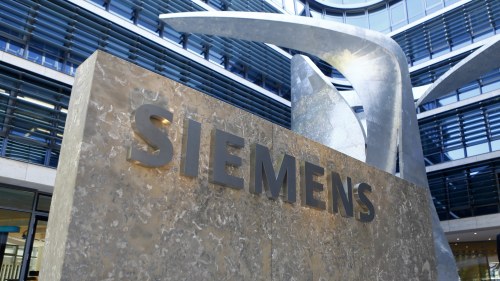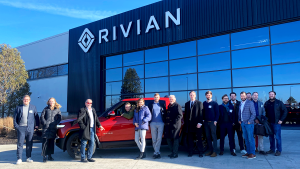Beyond Michael Jordan: Translating Chicago for international businesses

How would you explain Chicago’s business culture to folks who have never been to the U.S.? Here’s how one expert does it.
Folks who live outside of Chicago might think they know it from TV or sports, and that can be especially true for people in other countries. Be it “The Bear,” “Chicago Fire,” or the Bulls, the city has a global cultural footprint. But those cultural touch points don’t really reflect the daily life, culture, and values of Chicago, says the president and CEO of the German American Chamber of Commerce of the Midwest.
Headquartered in the Loop, the chamber helps German companies enter the U.S. market and set up shop in the Midwest. In addition to arranging trade delegations, assisting with site selection, and conducting market research, the chamber offers something unique — cultural orientations that move past Chicago stereotypes for German firms hoping to grow in the Midwest.
To understand what really makes Chicago’s business culture distinct, we spoke with the chamber’s president and CEO, Mark Tomkins, who has been with the organization since 2006.
Subscribe to ChicagoGlobal
This story first appeared in the ChicagoGlobal newsletter, a joint project of Crain's Chicago Business and the Chicago Council on Global Affairs.
This interview has been edited for length and clarity.
AJ Caughey, ChicagoGlobal: Why is it important for German businesses or other international firms entering the United States to have an understanding of American culture?
Mark Tomkins, German American Chamber of Commerce of the Midwest: Globally — not just [in] Germany — everybody thinks they have an understanding of what U.S. culture is. They get it [in] movies and in TV shows, so they get a vivid representation of what they think the U.S. is like.
Now, of course, you ask any American, “Hey, is U.S. culture what you see in the movies or what you see on TV?” And they’re going to say, “No! Of course we’re not Ted Lasso.” If you look at “Chicago Fire,” what you see there is very different from a daily Chicagoan’s life.
I think that’s the first bridge that we have to create, to say, “Yes, you’ve probably gone to a trade show in the U.S. Yes, you probably vacation in the U.S. Yes, you definitely consume American media. But now we need to bridge some of that cultural gap of that reality of what's represented on screen versus the reality of day-to-day working with Americans.”
AJ Caughey: How do you start to do that?
Mark Tomkins: [When] we have a trade delegation, there’s usually a briefing session where we walk through the basics of “How do you present yourself in the U.S.,” and we break down some of the German stereotypes.
Germans are most likely going to give you their entire company history, their whole background … and at some point they might get around to why that’s relevant to their argument.
You have to kind of back them up and say, “We’re going to start over from a new starting point. They [the U.S. audience] want to know what you can do for them.”
Something as basic as how to start a conversation or networking is completely different. You can get blinded, because we think we know each other so well — but some of the very basics are missing. Because, let’s face it, TV and movies don’t show you how to do business in the U.S.

A German trade delegation exploring electric vehicles and charging infrastructure visited EV manufacturer Rivian Automotive in Normal, Illinois, in early December.
AJ Caughey: What is unique regionally about Chicago or Midwest business culture? What is important to understand about our area?
Mark Tomkins: It can be challenging getting Germans here in the first place. Going back to media, what do they see? They see the coasts. They see New York, they see L.A., they see Florida.
The impression a lot of companies have of Chicago might be that they flew through O’Hare at some point. They don’t necessarily know the city, know the region, or know what’s here.
In the past, the stereotype was Al Capone or Michael Jordan. That cultural understanding doesn’t mesh well with reality.
Now, thankfully, a lot of Germans come in and say they really didn’t know what to expect in Chicago. And then they get into our office and look out and see Millennium Park. They see Lake Michigan. They see the cultural assets of the amazing space that is Chicago. And they’re like, “Wow, I never imagined this.”
There are also cultural linkages from immigration back to Germany, Poland, etc., so you have a lot of shared values: the basic fundamental friendlessness that’s there, the basic fundamental approach to business that says, “Hey, we’re going to be straight shooters and honest.”
That’s not to say every business in the Midwest is built that way, but it’s much more common for us to have that core understanding of how we do business here compared to the coasts.
AJ Caughey: What are some of the largest German companies that employ folks in the Chicago area?
Mark Tomkins: There’s big names like Siemens or Haribo. But, I think more importantly, in greater Chicagoland we have the largest concentration of German-owned companies anywhere in the United States.
These are mostly what we call “hidden champions”: family-owned, small and mid-sized companies. Sometimes, they are second-, third-, or fourth-generation. They aren’t necessarily stock-market-listed companies, but they’re hugely successful, household names in the niche they’ve chosen, like Wittenstein, Harting, and Herrmann Ultrasonics.
AJ Caughey: In 2015, the German government passed a law stating that non-executive boards should be at least 30% female. Compared to American firms, what are some of the cultural expectations around diversity, equity, and inclusion, and how are they different?
Mark Tomkins: It’s a really good question. It’s changing so fast. You can’t say there’s one DEI model or one DEI approach that’s the same across Germany, much like in the U.S.
You mentioned the 30% corporate board representation for women. In Germany, initiatives are expected to be backed up by data … and [companies] publish that data. Companies that just go out and say, “Green this, green that, sustainable this, sustainable that” — unless you can back it up with numbers, you often get very heavy backlash.
The things that are hard to measure, though, maybe don’t get as much focus [in Germany]. In the U.S., I can come up with initiatives and have very real discussions on this [DEI topic] that may be harder to quantify. Whereas in Germany, if those areas don’t get quantified, then it may not become an area of focus because people think, “If I can’t measure it, then why am I going to do it?”
This story first appeared in the ChicagoGlobal newsletter, a joint project of Crain's Chicago Business and the Chicago Council on Global Affairs. Subscribe today.

